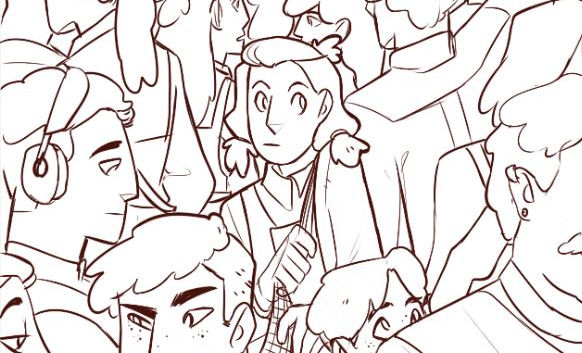
The Flower from
the Ocean
A short ecocritical comic exploring Earth ownership, resource
exhaustion, and environmental existentialism
The Flower from the Ocean is a short comic set in a dystopian world where agriculture has been abandoned. On an Earth-like planet that has been overtaken by floods and the natural land stripped bare, the human colonizers subsist on artificially created food. When a young girl discovers a flower in the ocean, the dumbstruck people must decide how to react to the knowledge that their planet may still be alive.
This comic is one of a few creative projects that I have been working on. While it is only in the first draft and still under development, The Flower from the Ocean enters the contemporary environmentalist conversation through a critical lens. In particular, I wanted to focus on issues of anthropocentrism and environmental existentialism.
Anthropocentrism and the Dystopian Landscape
In today's post-nuclear age, popular media has become increasingly aware of the role that nature plays in hypothetical dystopias. Humanity is naturally tied to the fate of the earth; it is impossible for any person to pass a day without consuming part of earth's natural resources, be it fossil fuels, food, water, or air. Our awareness of this reliance, in the age of anxiety, has blossomed into a panic. Contemporary literature has increasingly reflected the shared horror of a "nuclear earth" through dystopias defined by the exhausted state of nature. From popular young adult fiction such as The 100 and James Dashner's Maze Runner series to critically acclaimed novels such as Philip Dick's Do Androids Dream of Electric Sheep? and

An excerpt from page 11 of The Flower from the Ocean
Cormac McCarthy's The Road, the end of the world is now synonymous with the end of the planet.
Of course, this perspective has benefits. It highlights the mutually influential relationship between nature and humanity and insists that what happens to one must naturally affect the other. This correlation has been foundational in the recent efforts of environmentalists such as Greta Thunberg. Such a perspective adds weight to natural disasters and realizes the impact of nature in daily life.
However, this viewpoint is ultimately rooted in anthropocentrism. By equating humanity's demise with the corruption of nature, these dystopian landscapes - understandably - rationalize nature with human priorities. As the landscape shifts and changes, often influenced by human decisions, the way that humans function within that space inevitably changes; yet nature does not cease to exist once it has evolved beyond the idyllic Muirian environmental aesthetic.
Defining nature in this way innately reifies it as a resource to be exploited. A more healthy dynamic needs to be explored, one that understands the relationship between humanity and nature as a fluid conversation that does not centralize the traditional human ideal of nature. At the same time, the influences (both negative and positive) that human beings have on nature cannot be ignored. This dynamic can be more completely understood as a conversation between humans and nature. Therefore, The Flower from the Ocean attempts to place humanity back where it belongs - as an evolving part of nature itself.
From Climate Anxiety to Environmental Existentialism
Over the past decade, climate anxiety has been on the incline, negatively influencing young people globally on a daily basis. In today's digitally mediated world, the environmental crisis has become an integral part of the public consciousness. With instantaneous exchange from all corners of the globe, young social media users are constantly saturated with each environmental disaster,

An excerpt from page 20 of The Flower from the Ocean
leading many to conclude that the earth is past saving. Political battles on global warming headline news outlets and fill Twitter feeds, the trauma of floods and droughts is shared through the experiences of international online friends, and debates concerning energy use trend on popular social media outlets. The climate crisis is experienced in a new, hyper-relevant way. The consequent and natural panic developing in the youth demographic is staggering, with many young people deciding to forgo having children in the name of saving the planet, and, remarkably, to keep innocent children from suffering in a future world destroyed in the name of human progress. To these young people, the earth is one generation away from collapse.
This is how the climate crisis has erupted into a state of what I like to call environmental existentialism. Environmental existentialism is the widespread and pervasive dread regarding the state of nature, particularly as it leads to feelings of hopelessness and helplessness. While environmental existentialism is most commonly experienced by younger Millennials and Gen Z, they should not be wholly held responsible for this perspective.
This planet was inherited by this generation, and the broil-ing environmental anxieties came with that inheritance. In today's explosive age, as the younger generation is expected to step into a new world while keeping the traditional roles and rules of their grandparents, environmental existentialism is just one of many dilemmas thrust on an unprepared class of children.
In The Flower from the Ocean, the world is steeped in environmental existentialism. It is only through the efforts and hope of the young main character that the planet is, at least for the human race, "saved." This comic has attempted to calibrate a new, more hopeful outlook that can ease environmental existentialism and produce more legitimate change while encouraging the youngest citizens of our world to see a future that extends well past their own lifetimes.
The comic is currently in its first draft, with lineart and dialogue. I am currently working on finishing the pages and overall editing.
See concept art for this project here.
Read the complete first draft of The Flower from the Ocean: